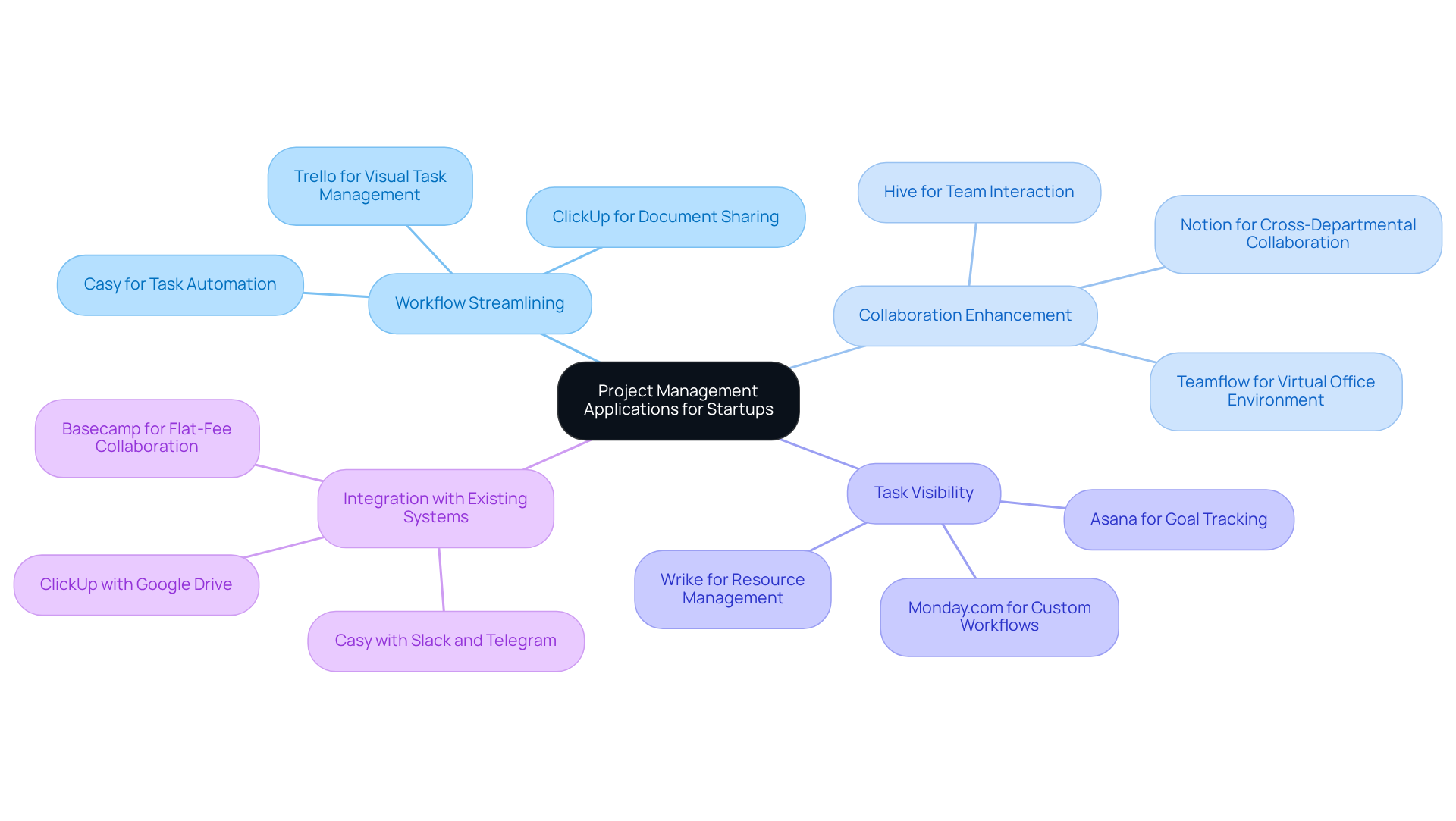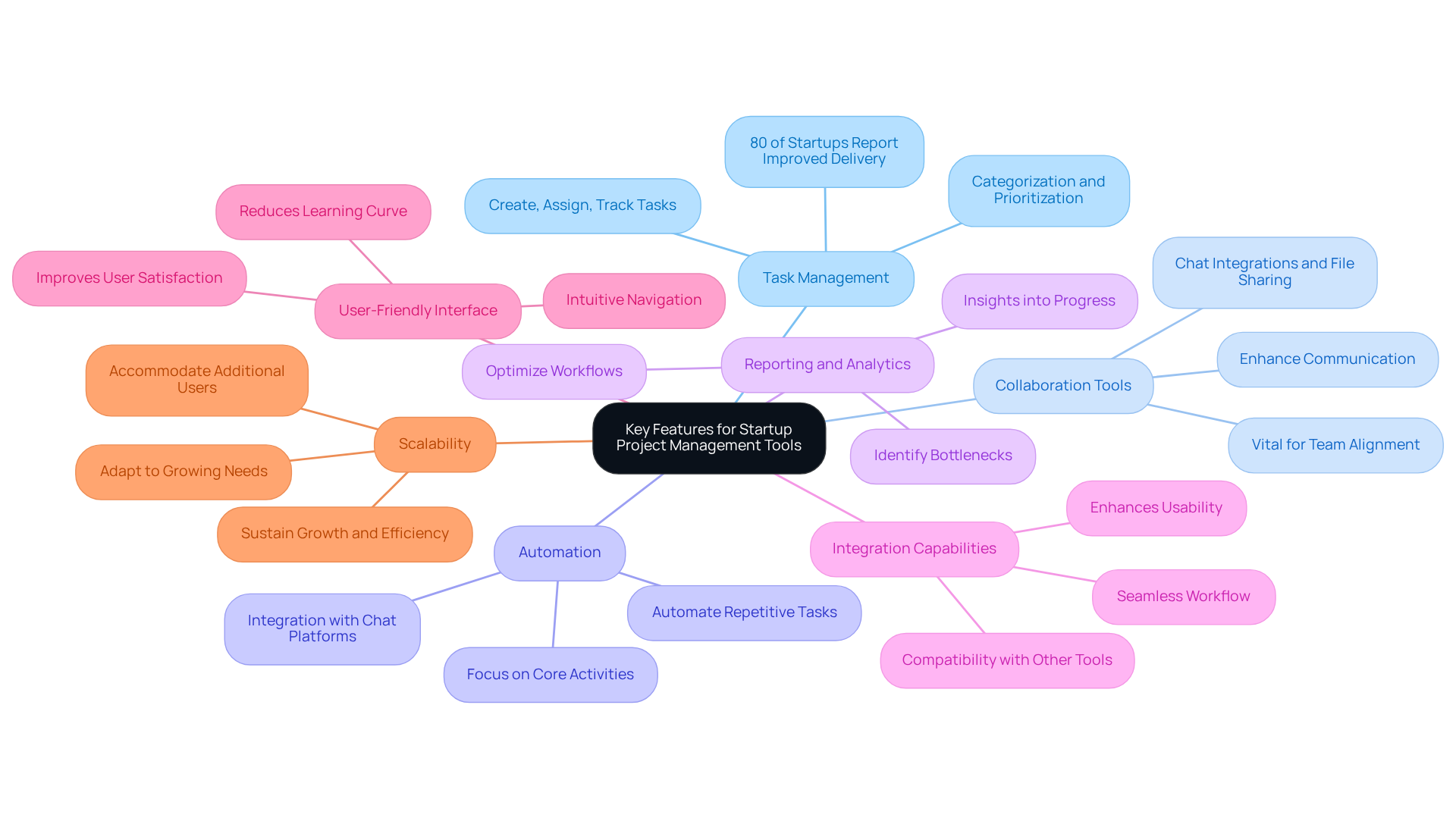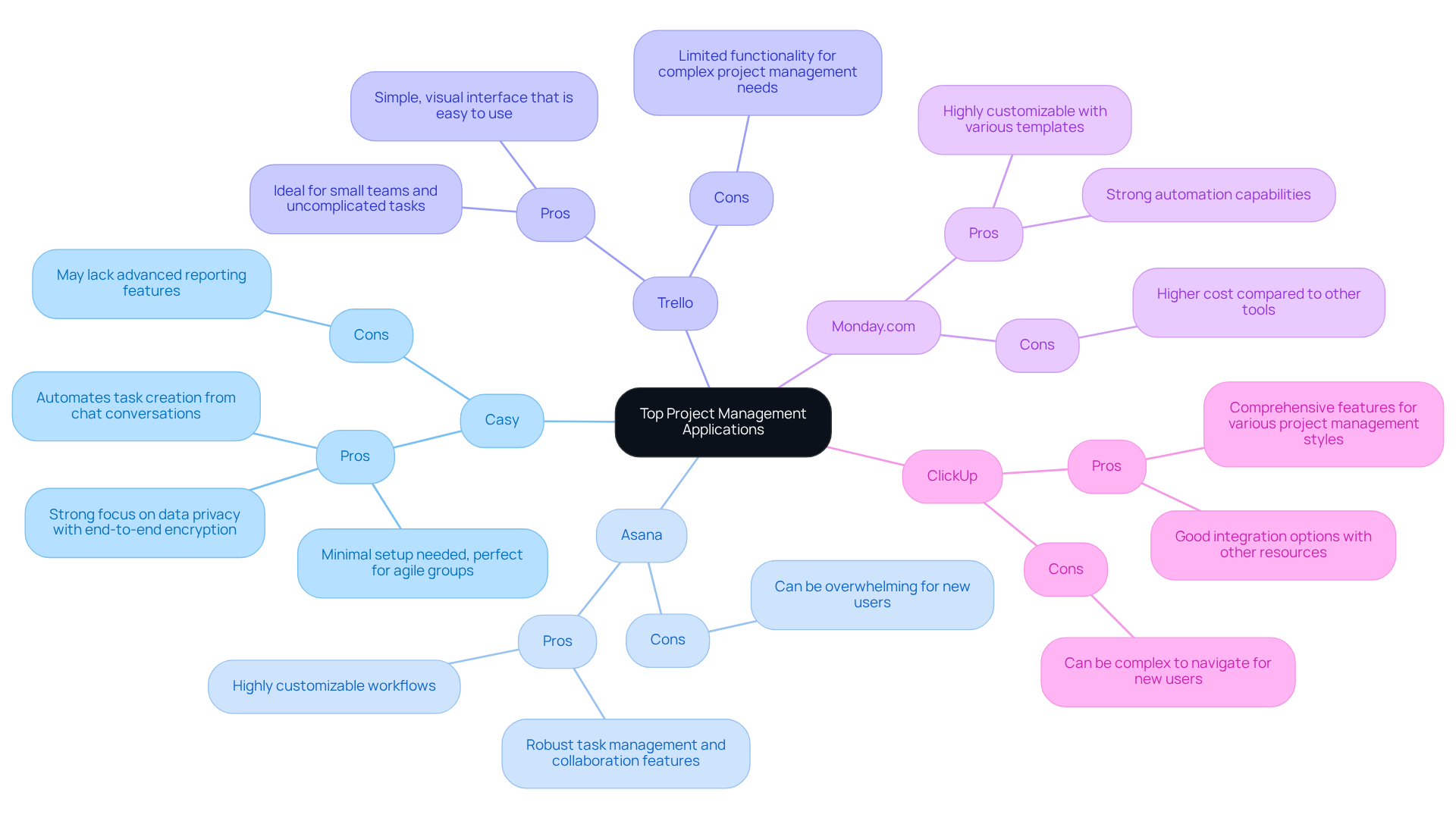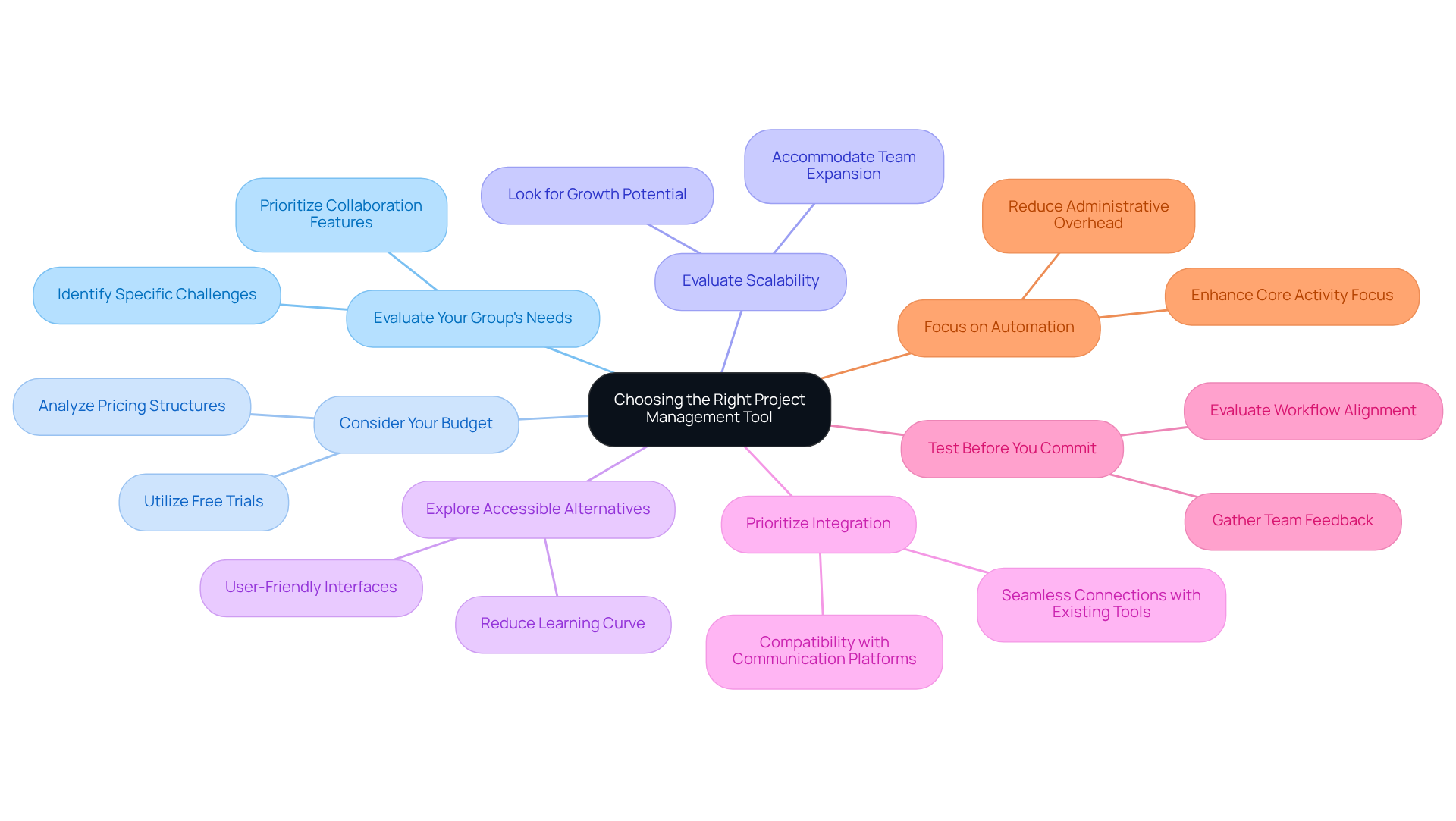Overview
This article delivers a comparative analysis of project management applications specifically designed for startups, underscoring their essential features, advantages, and disadvantages, along with recommendations for selection. Choosing the right tool can significantly boost productivity and collaboration. This assertion is supported by a thorough evaluation of applications such as Casy, Asana, and Trello, each catering to distinct operational needs and preferences within the startup environment.
Have you ever considered how the right project management tool could transform your startup's operations? The detailed insights provided here not only highlight the strengths of these applications but also reveal potential pitfalls, ensuring that you make an informed decision. By understanding the unique capabilities of Casy, Asana, and Trello, startup founders can align their selection with specific operational requirements, ultimately fostering a more collaborative and efficient work environment.
In conclusion, the right project management application is not just a tool; it is a strategic asset that can propel your startup forward. Embrace the opportunity to enhance your productivity and collaboration by carefully evaluating these options and selecting the one that best fits your needs.
Introduction
Project management applications have become essential for startups striving to navigate the complexities of rapid growth and dynamic environments. These tools not only streamline workflows but also foster collaboration and enhance visibility, empowering teams to meet deadlines and allocate resources effectively. Yet, with a plethora of options available, how can startups pinpoint the right application that aligns with their unique needs and operational goals? This article embarks on a comparative analysis of leading project management applications, spotlighting their key features, benefits, and potential drawbacks. Ultimately, it guides startups toward making informed decisions that could unlock their full potential.
Understanding Project Management Applications for Startups
Project management applications are indispensable for startups, as they streamline workflows, enhance collaboration, and improve task visibility. These tools empower teams to manage tasks efficiently, ensuring that deadlines are met and resources are allocated effectively. In the fast-paced environments that startups often navigate, agility and adaptability are paramount.
Therefore, selecting a task coordination tool that integrates seamlessly with existing workflows and communication platforms is crucial. For instance, tools like Casy, which automate task creation and updates, can significantly alleviate administrative burdens, enabling teams to concentrate on their core activities.
By understanding the various categories of application tools—ranging from basic task trackers to comprehensive organizational suites—startups can make informed decisions that align with their operational goals.
Are you ready to enhance your team's productivity and collaboration? The right project management applications could be the key to unlocking your startup's full potential.

Key Features Essential for Startup Project Management Tools
When evaluating project management tools, startups should prioritize several key features:
-
Task Management: The ability to create, assign, and track tasks is fundamental. Tools must facilitate the categorization and prioritization of tasks to enhance workflow efficiency. In reality, efficient task organization is associated with enhanced results; 80% of startups indicate improved delivery when utilizing such resources.
-
Collaboration Tools: Features that enhance communication among group members, such as chat integrations and file sharing, are essential for maintaining alignment. Startups gain significantly from tools that bolster collaboration, as clear communication is vital for success in their endeavors.
-
Automation: Automating repetitive tasks like status updates and reminders can save time and reduce errors. Casy excels in this area by automatically capturing information from chat platforms like Slack and Telegram, enabling groups to focus on core activities without the burden of manual updates. Additionally, Casy's commitment to data privacy and security ensures that user content remains confidential, a significant concern for many startups.
-
Reporting and Analytics: Insights into initiative progress and team performance are essential for making data-driven decisions. Startups leveraging analytics can identify bottlenecks and optimize workflows, enhancing overall productivity.
-
Integration Capabilities: The ability to integrate with other tools (e.g., Slack, Google Drive) enhances usability and ensures a seamless workflow. Startups often rely on multiple project management applications, making integration a key consideration in their project management strategy.
-
User-Friendly Interface: A clean and intuitive interface is crucial for quick adoption by team members, especially in fast-paced environments. Tools that are easy to navigate can significantly reduce the learning curve and improve user satisfaction. As noted by Ramona, startups often choose tools with unnecessary features, leading to confusion and inefficiency; thus, user-friendliness is a critical factor.
-
Scalability: As startups expand, their management requirements will evolve. Tools must adapt alongside the organization, accommodating additional users and initiatives without sacrificing performance. This flexibility is essential for sustaining growth and preserving efficiency in execution.
The anticipated expansion of project management applications in the software sector, likely to reach $10 billion by 2026, underscores the significance of utilizing efficient tools for handling initiatives in the startup environment. Moreover, approaches such as OKRs and the Eisenhower Matrix, utilized by Casy, help startups prioritize tasks efficiently, aligning with organized strategies.

Comparative Analysis of Top Project Management Applications: Pros and Cons
Here is a comparative analysis of some of the top project management applications for startups:
-
Casy
- Pros:
- Automates task creation from chat conversations.
- Minimal setup needed, perfect for agile groups.
- Strong focus on data privacy with end-to-end encryption.
- Cons:
- May lack advanced reporting features compared to some competitors.
- Pros:
-
Asana
- Pros:
- Robust task management and collaboration features.
- Highly customizable workflows.
- Cons:
- Can be overwhelming for new users due to its extensive features.
- Pros:
-
Trello
- Pros:
- Simple, visual interface that is easy to use.
- Ideal for small teams and uncomplicated tasks.
- Cons:
- Limited functionality for complex project management needs.
- Pros:
-
Monday.com
- Pros:
- Highly customizable with various templates.
- Strong automation capabilities.
- Cons:
- Higher cost compared to other tools, which may be a barrier for startups.
- Pros:
-
ClickUp
- Pros:
- Comprehensive features that cater to various project management styles.
- Good integration options with other resources.
- Cons:
- Can be complex to navigate for new users.
- Pros:
This comparative analysis highlights that while Casy offers unique automation features tailored for startups, other project management applications, such as Asana and Monday.com, provide comprehensive functionalities that could benefit larger teams or more complex tasks. As a startup founder, which features resonate most with your team's needs?

Recommendations for Choosing the Right Project Management Tool for Your Startup
Choosing the right project management tool for your startup is a critical decision that requires careful consideration of several key factors:
- Evaluate Your Group's Needs: Begin by identifying the specific challenges your group faces. What features would effectively address those issues? For example, if communication is a hurdle, prioritize tools with robust collaboration capabilities.
- Consider Your Budget: Operating with limited resources is common for startups. Analyze the pricing structures of various tools and take advantage of free trials to assess value before making a commitment.
- Evaluate Scalability: Select a tool that can grow alongside your startup. Look for features that can accommodate increasing complexity as your team expands.
- Explore Accessible Alternatives: A user-friendly tool will facilitate quicker adoption among team members, significantly reducing the learning curve.
- Prioritize Integration: Ensure the software can seamlessly connect with other applications your group already uses, such as communication platforms and file storage services.
- Test Before You Commit: Utilize free trials or demos to evaluate how well the tool aligns with your group's workflow. Gather feedback from team members to confirm it meets their needs.
- Focus on Automation: Tools like Casy that offer automation can drastically reduce administrative overhead, allowing your team to concentrate on core activities.
By adhering to these recommendations, startups can select project management applications that not only enhance productivity but also align with their unique operational dynamics.

Conclusion
Selecting the right project management application is crucial for startups aiming to streamline operations, enhance team collaboration, and boost productivity. The insights provided throughout this article underscore the significance of choosing tools that align with specific operational needs and foster an agile work environment. With the right application, startups can effectively manage tasks, improve communication, and ultimately drive growth.
Key features such as:
- Task management
- Collaboration tools
- Automation
- Reporting
- Integration capabilities
- User-friendly interfaces
- Scalability
are essential considerations when evaluating project management applications. Tools like Casy stand out for their automation capabilities and focus on data privacy, while others like Asana and Monday.com offer robust functionalities for larger teams. Each application presents its own strengths and weaknesses, making it imperative for startups to assess their unique requirements before making a decision.
In conclusion, the landscape of project management applications is rapidly evolving. Startups must embrace these tools to navigate their challenges effectively. By prioritizing the right features and conducting thorough evaluations, startups can equip themselves with the necessary tools for success. The journey toward enhanced productivity and collaboration begins with an informed choice—start exploring the options available and unlock the full potential of your startup today.
Frequently Asked Questions
Why are project management applications important for startups?
Project management applications are essential for startups as they streamline workflows, enhance collaboration, and improve task visibility, helping teams manage tasks efficiently and meet deadlines.
What benefits do project management applications provide to teams?
These tools empower teams to efficiently manage tasks, ensuring effective resource allocation and enabling teams to focus on core activities by reducing administrative burdens.
What features should startups look for in a project management application?
Startups should look for tools that integrate seamlessly with existing workflows and communication platforms, as well as features that automate task creation and updates.
Can you give an example of a project management tool suitable for startups?
An example of a suitable project management tool for startups is Casy, which automates task creation and updates, helping to alleviate administrative burdens.
How can understanding different categories of project management tools help startups?
By understanding the various categories of application tools, ranging from basic task trackers to comprehensive organizational suites, startups can make informed decisions that align with their operational goals.
What is the ultimate goal of using project management applications for startups?
The ultimate goal is to enhance team productivity and collaboration, which can unlock the startup's full potential.




